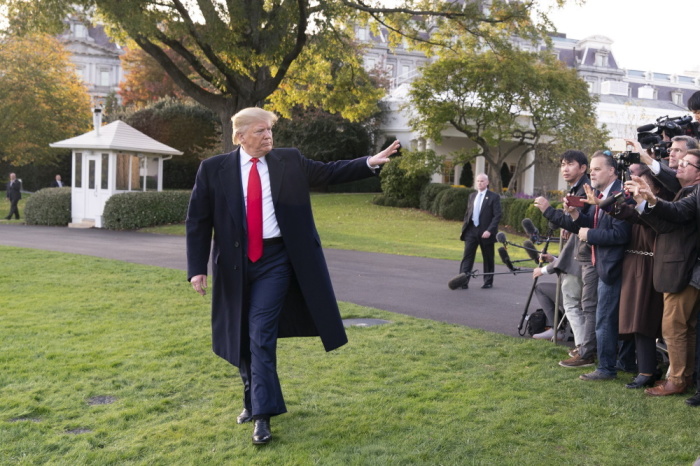Reminder: Evangelicals are about evenly split on Trump (analysis)

News of evangelical support for President Donald Trump has been overstated.
In a Thursday tweet, Liberty University President Jerry Falwell Jr. wrote that only "17% or so" of evangelicals opposed Trump in 2016. This is incorrect.
The most often cited number when it comes to evangelical support for Trump is "81%," which is likely what Falwell had in mind. But that number comes with many caveats: 1) it only includes white evangelicals, 2) it only includes self-identified evangelicals, which means non-churchgoers and people who don't hold evangelical beliefs could be included, 3) non-voters were not polled and so their numbers are not included in the denominator, and 4) it was based upon exit polls, which are among the least reliable polls.
Taking all those factors into consideration, as previously explained by The Christian Post in 2018, Trump-supporting evangelicals represent about half, at best, and likely less than half, of all evangelicals.
Understanding this, it makes more sense that a recent Politico/Morning Consult poll found that 43% of evangelicals support removing Trump from office.
Thirty-four percent of evangelicals strongly approve, 9% somewhat approve, 4% somewhat disapprove, and 49% strongly disapprove of removing Trump from office. These numbers additionally show that evangelicals are much more divided on Trump than Falwell and others suggest.
(The Politico report doesn't say how evangelical was defined or if non-white evangelicals were included. The Christian Post reached out to Politico for an answer. This article will be updated when a response is received.)
The context of Falwell's tweet was the imbroglio over Christianity Today's editor-in-chief Mark Galli calling for the removal of Trump from office. Various voices in this debate have claimed to represent and speak for the views of the vast majority of evangelicals.
In a Friday CNN interview, Galli labeled evangelicals who disagree with him as "far right."
Trump responded to the editorial by labeling Christianity Today a "far left magazine."
Rev. Franklin Graham wrote "Christianity Today ... is representing the elitist liberal wing of evangelicalism."
Pastor Jentezen Franklin wrote in an op-ed for The Christian Post that Galli's editorial was "Just the opinion of one man," "And in no way reflects the values and heart of Christianity today in these United States of America."
Pastor Jack Graham claimed Christianity Today "is increasingly liberal and out of step and out of touch with conservative Christians and churches."
First Things Senior Editor Matthew Schmitz, a Catholic, wrote that Christianity Today editors "have functionally ceased to be evangelical" because they'd rather "freelance for The New Yorker than to appear on Tucker Carlson."
In a letter to Christianity Today, close to 200 evangelical leaders slammed the magazine for not representing the voice of Trump-supporting evangelicals: "Of course, it’s up to your publication to decide whether or not your magazine intends to be a voice of evangelicals like those represented by the signatories below, and it is up to us and those Evangelicals like us to decide if we should subscribe to, advertise in and read your publication online and in print, but historically, we have been your readers."
And in Falwell's tweet mentioned above, he claimed Christianity Today is "part of the same 17% or so of liberal evangelicals who have preached social gospel for decades! CT unmasked!"
Who is right? None are. Or they all are, depending on how you look at it. Evangelicals are too diverse for any single person to represent a majority. Evangelicals don't have a pope.
As Kristin Kobes Du Mez, associate professor of History and Gender Studies at Calvin College, noted in a paper presented in January, a better way to think of evangelicalism is that there are "many evangelicalisms."
“Is evangelicalism a theological category, a cultural movement, a white religious brand, a diverse global movement? What if the answer is ‘all of the above’?” Du Mez said.
“There are, in fact, many evangelicalisms, and each is imagined with a different center and different boundaries. If we consider evangelicalism an imagined religious community, imagined as inherently limited, bounded with insiders and outsiders, we must pay careful attention to questions of power.”
Similarly, a Nov. 2018 report by the Center for Religion and Civic Culture at the University of Southern California, titled "The Varieties of American Evangelicalism," argued there are five types of evangelicals: Trump-vangelicals, Neo-fundamentalist evangelicals, iVangelicals, Kingdom Christians, and Peace and Justice evangelicals, and none of these represent a majority of all evangelicals.
When it comes to support for Trump, Jerry Falwell Jr., Jentezen Franklin, Franklin Graham and Jack Graham all represent the interests of a segment of evangelicalism. But so does Mark Galli.





























